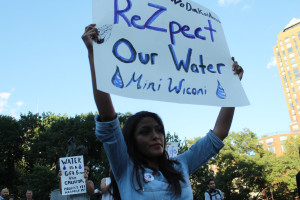
As North America sat down to watch the most bruising, brutal Presidential debate in history, many would have been forgiven for missing other news.
In a setback to those fighting the highly controversial Dakota Access Pipeline, the US Court of Appeals for the District of Columbia Circuit issued a ruling denying the Standing Rock Sioux’s tribe request for a permanent injunction to stop the pipeline.
Despite the ruling, is it unlikely that construction is going to recommence any time soon.
Over the last few months, the protests by the Standing Rock Sioux have transformed the Dakota Access Pipeline from a little known piece of North America oil and gas infrastructure into the most controversial fossil fuel project in the world. There are now an estimated 4,000 people encamped at the Sacred Stone Camp.
However yesterday’s court ruling means that the company building the pipeline, Energy Transfer Partners, could now in theory continue construction on some privately held land running up to the Missouri River.
However, even the court admitted that the ruling was “not the final word,” conceding that the final decision lies with the Corps of Engineers, which holds jurisdiction over the contentious land.
And although the three-judge panel ruled that the Tribe had not met the conditions necessary for securing an injunction, the judges did note: “A necessary easement still awaits government approval … where the Tribe alleges additional historic sites are at risk. We can only hope the spirit of [the law] may yet prevail.”
In response to the judgement the Standing Rock Sioux Tribe announced it will continue the fight against the pipeline.
Speaking after the judgement, Chairman of the Standing Rock Sioux, Dave Archambault II called the ruling “disappointing,” but vowed to continue the struggle: “We aren’t done with this fight,” he said.
“We are guided by prayer, and we will continue to fight for our people. We will not rest until our lands, people, waters and sacred places are permanently protected from this destructive pipeline.”
He added: “This ruling puts 17 million people who rely on the Missouri River at serious risk. Already, the Dakota Access Pipeline has led to the desecration of our sacred sites when the company bulldozed over the burials of our Lakota and Dakota ancestors. This is not the end of this fight. We will continue to explore all lawful options to protect our people, our water, our land, and our sacred places.”
Archambault also said there were some indications that the Judges wanted the project “to not proceed”.
“It seems they are coming to the same conclusion as the federal government in acknowledging there is something wrong with the approvals for the pipeline,” he said. “We see this as an encouraging sign.”
Nothing will happen until the Government clarifies its position. Due to the on-going protests, last month, in a highly unusual step the Army Corps, Justice Department and Interior Department announced they would not allow work to proceed on federal land close to the Missouri River, until further environmental reviews had been undertaken.
We are still weeks away from those reviews being finalised.
Also the court has yet to rule on the Tribe’s appeal of a further September ruling not to shut down construction on the whole pipeline.
So this fight has a long way to play out yet.
